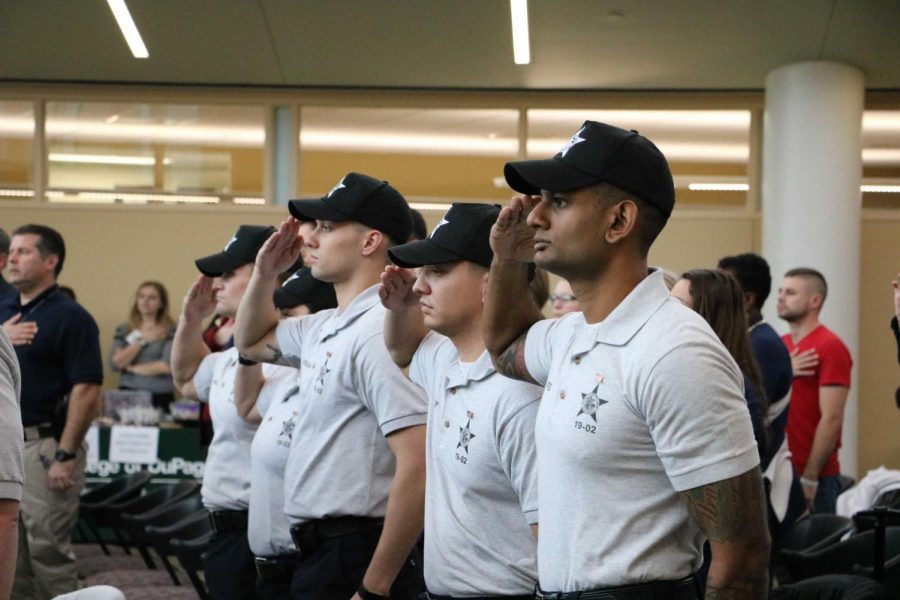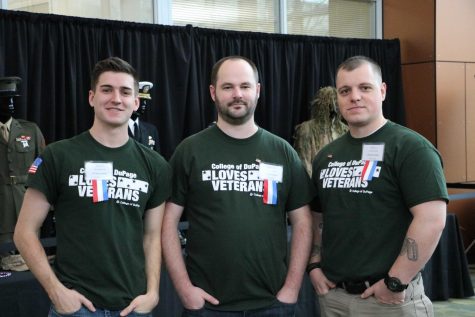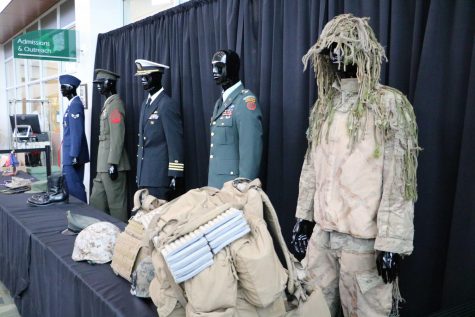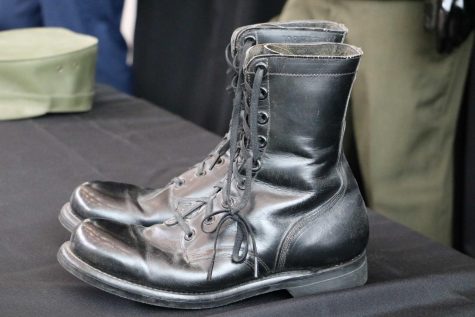What Your Country Can Do For You
November 19, 2018
While many young people today view it is a last resort, for those who serve in the military it’s the gift that keeps on giving. Misconceptions about what it means to serve may leave many people reluctant to consider it an option. The reality is much different from the image presented in media and entertainment. Although there are those who do deploy, significant numbers of those in the military, in the reserve, or in the National Guard are fulfilling support roles from home. While doing so they are given the opportunity to serve their country and study and develop long-term technical skills.
“[Deploying] isn’t what the military is necessarily about,” said Josh Schneider, College of DuPage (COD) student and a member of the Illinois National Guard. “There are a thousand different jobs in the military. You can do anything from being a cook to being in the infantry, and it doesn’t mean you are doing anything less than anyone else. It’s a way to serve.”
Schneider joined the guard at 17, and although he was not sure whether he wanted to join the active duty military, he knew he wanted to get a college degree and serve his country.
“The National Guard fit what I wanted,” Schneider said.
Serving in the Illinois National Guard means 100 percent of Schneider’s in-state tuition is covered. Not only is Schneider able to meet his educational goals, but he also benefits from the opportunity to develop personally and professionally.
“There’s a large variety of people that are in the military and a lot have joined for different reasons [like a] sense of duty or to go to school,” Schneider said. “It allows them to develop two sides of their lives, their civilian side and their career.”
On Sunday, America woke up to celebrate Veterans Day and to thank those who have served their country, but every year the number of veterans in America dwindles. As military recruiters work to convince new soldiers to enlist, they contend with a generation of young people who either cannot serve or lack the interest to do so. The percentage of Americans who are veterans has shrunk to single digits, and the percentage of Americans who are currently active duty is less than 1 percent, according to the Pew Research Center. While an all-volunteer military allows Americans the benefit of choice previous generations did not enjoy, it also means significant numbers of Americans cannot name someone who has served.
“The degree of separation between those that serve or know someone has served has expanded,” said Jose Alferez, manager of student financial assistance at COD and former manager of veterans services at COD. “It used to be that many would have an immediate family member, and now most people can’t come up with someone, or it’s some distant relative or friend.”
This creates a greater problem for recruiters as, according to the Army Times, a large number of those who join do so because a family member has served.
“It has become a family business,” USAREC Sgt. Maj. Anthony Bowers told the Army Times.
Adding to this challenge is the stigma and the misconceptions associated with service.
“Even though it’s not a negative subject, it can be perceived that way because no one knows what that world is like, “said Alferez. “They see what they see on TV, for good and bad, and they assume that that’s the whole story.”
Schneider agreed. In his experience many young people don’t view the military as a possible option.
“A lot of people see the military as something they’ll never be able to achieve, and it’s not something right for them,” said Schneider. “Just because you join the military doesn’t mean you are going to be in a position to be deployed or in a combat zone. I’ve been in for almost six years and have never deployed anywhere.”
While concerns about combat injuries and Post Traumatic Stress Disorder (PTSD) and national recognition of the health issues returning soldiers face have increased, the majority of those who serve are not exposed to the combat that puts some veterans at a high risk for trauma exposure or traumatic brain injuries. According to the National Institute of Health, PTSD affects 7.7 million American adults, and although veterans brought the health issue to public attention, the illness should not be solely associated with military service or combat trauma.
Veteran’s Day reminds Americans of the gratitude owed to those who have served on our behalf. However, the “sea of goodwill” soldiers face today when they return home is not always the kind of gratitude veterans want and need.
“The ‘sea of goodwill’ is a lot of good people trying to do a lot of great things, but it can be overwhelming,” said Alferez. “You are trying to navigate reintegration into civilian life. One of the things I think people can truly do to help vets is to really provide them with opportunities to utilize their skills.”
While gratitude may seem like a “non-problem,” as Alferez described it, many veterans feel that good intentions can go too far.
“The narrative that has been established for returning veterans has been unhelpful, [that] we’re broken,” retired Green Beret Scott Mann told Business Insider. “That couldn’t be further from the truth in most cases. Most of the veteran population are high functioning, and we actually need them … putting [their] skills into play.”
Alferez, who served in the Marine Corp for four years, is grateful for his years of service and the opportunities it afforded him.
“There are a lot of skills that I learned, beyond the technical stuff … [I] wouldn’t have picked up anywhere else. I certainly wouldn’t be where I am if I hadn’t served,” said Alferez. “The fact that I had the opportunity [to go to college] after my military career really helped set me up for success.”
Alferez recognizes many struggle to know how to appropriately express their appreciation to veterans, but he encourages Americans to “recognize service members’ work and place true value on it.” What veterans really want and need are jobs in the civilian sector that allow them to translate their skills from the military into the workforce.
For many who join, these skills are a huge motivating factor. The educational benefits, healthcare and technical training the military provides allow a service member to seek opportunities and develop skills that open doors to long-term opportunities.
“Sometimes you need to step back, and look at it, and see that it’s not only about what you can do for your country, but also about what your country can do for you,” Schneider said.
Many at COD take advantage of the opportunity to develop technical skills and seek education at a lower cost, but Schneider encourages COD students to consider the other options available to them, like the guard. Schneider is one of hundreds of COD students who are currently in the service and the number of COD students who are serving or have served fluctuates between 2 to 3 percent every year.
“It should be an option that people are more open to and, for whatever reason, people tend to close themselves off to that,” Schneider said. “Soldiers are just average people who have been trained to do a job, and that’s it.”
Q&A with Sergeant First Class Michael Vertucci, Recruiter for the United States Army.
- Is it easy or difficult to recruit people from this area?
I wouldn’t say that recruiting is necessarily easy in the DuPage County area or the Glen Ellyn area. It’s just a matter of educating and informing people on the opportunities they have to serve their country and community. Recruiting for the most part is fairly simple if your main objective is to help people and guide them towards a better future.
- Why do people from this area choose to join the military?
From my perspective people are joining the Army National Guard for the opportunities it will give them for their future. The typical applicant I deal with sees that they will be able to separate themselves from other candidates when applying for civilian jobs and also we are willing to give them a job skill and pay them to learn it at the same time. Typically, people are looking for ways to pay for college, and since we will cover all of their tuition it is an added benefit of serving part time in the Army National Guard. I deal mostly with criminal justice students, and they are able to see the competitive edge it will give them against other candidates when applying for police departments. I do all I can to make sure they are prepared when looking into Public Safety careers.
- What challenges and benefits of military service have you seen in those who get out of the military and pursue work or school?
I think the biggest challenge for people getting out of the military and pursuing a civilian career is the change or feeling a sense of purpose again. Not only the change with the environment but the change of the individuals that they work with on a regular basis. The bond that is built in the military and the trust you have with your counterpart is unlike anything you will find in the civilian sector. I believe that is why most service members look to get into para-military organizations such as the police department, fire departments, how many security and government agencies. It makes for a much easier transition and typically most servicemembers do very well within a line of work where people can count on each other at all times and where people are pursuing the same the same goal. Lastly, I feel a servicemember must have a plan when leaving the military, otherwise it is a very tough adjustment. I encourage people if they don’t have a plan when leaving the military, consider staying in a little bit longer until you know exactly what it is you are wanting to do.
For service members who get out I think that they have set themselves up for a great future in regards to schooling and a civilian career. Most companies and employers are looking to hire military members due to their work ethic and the attributes they have built during their time in the military. The qualities people learn in the military can’t be taught in any college classroom. With that, a military member, using the focus they were taught in the military, can do quite well in a classroom setting. I believe the discipline and accomplishment of the mission can carry over into the classroom from their time in the military.























